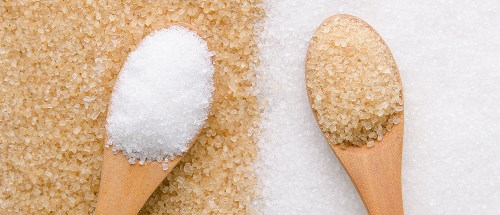Sugar. Once you start looking around, you find that it’s added to nearly everything. Even when you flip over something as innocent-looking as a ketchup bottle, you’ll find it as the second ingredient listed. It’s added to salad dressings, breads, pasta sauces, canned soups… and of course, there are loads of it in places you’d expect like sodas, candies, and pastries. Yet, we all know the dangers of consuming too much sugar, which can contribute to:
- Spikes (followed by crashes) in blood sugar
- Increased hunger
- Weight gain and obesity
- Diabetes
- Heart disease
- Reduced insulin sensitivity
- Increased blood triglycerides
- High blood pressure
- Acne
- Aging skin and cells
- Brain fog
- Dehydration
- Decreased energy levels
- Depression
- Cavities
- Fatty liver
- Increased risk of dementia, kidney disease, cancer, and gout
Sounds like it’s time for an alternative to the sweet stuff! It’s time to choose something more natural than the refined white powder that’s so ubiquitous in our food supply.
Raw Vs White Sugar
So, how about choosing “raw,” unrefined sugar (e.g., turbinado or evaporated cane), agave, or coconut sugar instead the next time you make homemade cookies, brownies, or banana bread? Those have to be better alternatives, right? Anything that’s less processed and refined is surely a better choice…
If you are hoping to make foods healthier by replacing refined sugar with raw sugar, the sad answer is no: They aren’t any healthier. Even those sugars that are touted for having health benefits—like coconut sugar, agave, raw honey, maple syrup, brown rice sugar, molasses—are, when it comes right down to it, just sugar.
Like white sugar, raw sugar is made from sugarcane or sugar beets. The juice from the cane or beets is extracted and then crystalized through evaporation. The difference in color is due to the fact that raw sugar does have a small amount of natural molasses left in it. This accounts for the golden color and, some would say, richer flavor. Raw sugar may also supply trace amounts of minerals like calcium, iron, and potassium. However, the amounts are so small, they’re considered negligible.
If you look at these various types of sugar from a nutritional standpoint, they’re all pretty much the same in terms of calories and sugars. Sure, they might have some minor differences, but naming these sweeteners as “healthy” alternatives is a big mistake.
When you’re counting the grams of added sugar in your diet, they’re all the same. The American Heart Association recommends limiting sugar intake to no more than six teaspoons of added sugar per day for women and nine for men—or no more than 10% of your daily calories. And it doesn’t matter if those come from the refined stuff or a less processed “raw” form.
As medical nutrition consultant and former USDA research nutritionist Susan Raatz explains, natural sugars do lose some of their nutritional quality in the refining process. The problem, however, is that unrefined sugar is nutrient sparse to begin with. The bottom line, she says, “It’s not good for you.”
What about the glycemic index (GI)? Aren’t coconut sugar and agave, for example, lower on the GI, meaning they won’t impact blood sugar levels as much as refined sugars? This may be true if you were eating straight sugar by the spoonful. However, sugar is typically added to other foods. Once proteins and fats are added to the dish, it’s unclear how that would impact the glycemic response.
And just because one food has a lower GI doesn’t necessarily make that food any healthier. You need to look at the entire picture. And no matter how you want to paint that picture, a high-sugar diet isn’t a healthy diet.
Because sugar is so taboo in nutrition circles, many manufacturers are trying to remove it from labels and using “healthier” sugars in their place. Yet again, sugar is sugar—no matter the form. Instead of looking for a sugar that’s “less bad,” look at your overall diet, be mindful, and do what you can to use less.
What To Use Instead?
Humans are born seeking sweetness because sugar means energy. And babies need a lot of energy to grow. In fact, within breast milk, you can find proteins and amino acids, live cells, enzymes, growth factors, and over 200 complex sugars, including lactose and oligosaccharides, which act as prebiotics to help support the colonization of the gut with healthy bacteria.
Once weened, humans still seek sweetness. Unfortunately, instead of reaching for whole foods (like fruits and vegetables) that contain naturally-occurring sugars, many of us are drawn toward chocolate, candies, sodas, and desserts. While fruits and vegetables are still the best choice, sometimes you just want a dessert.
There are, luckily, natural calorie-free alternatives to sugar, such as stevia, monk fruit, and sugar alcohols, like erythritol, that can often be used to replace sugar in recipes. So, you can still enjoy your desserts, including cakes (in moderation, of course), without worrying about the negative effects of sugar in any form.








